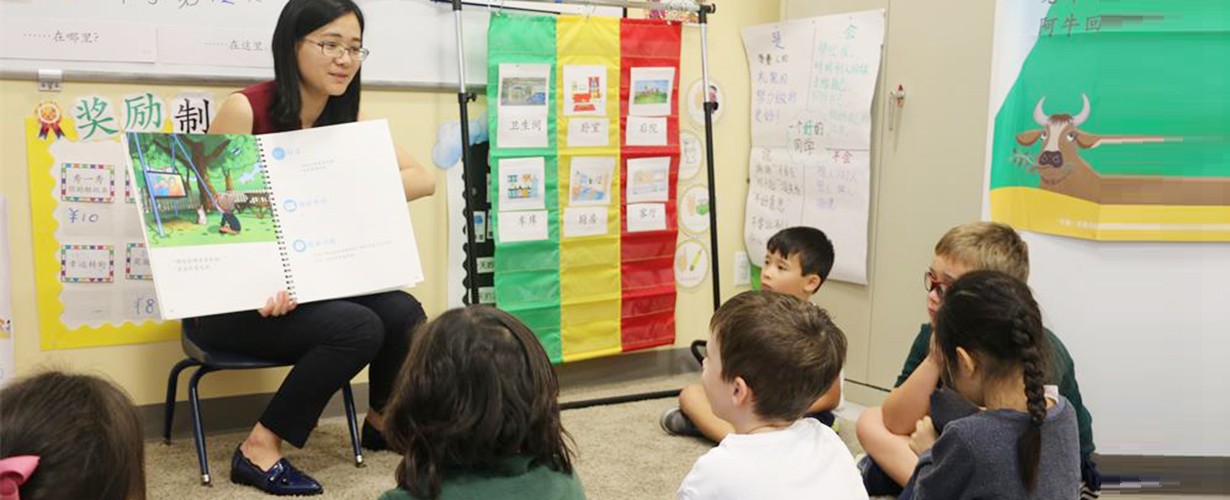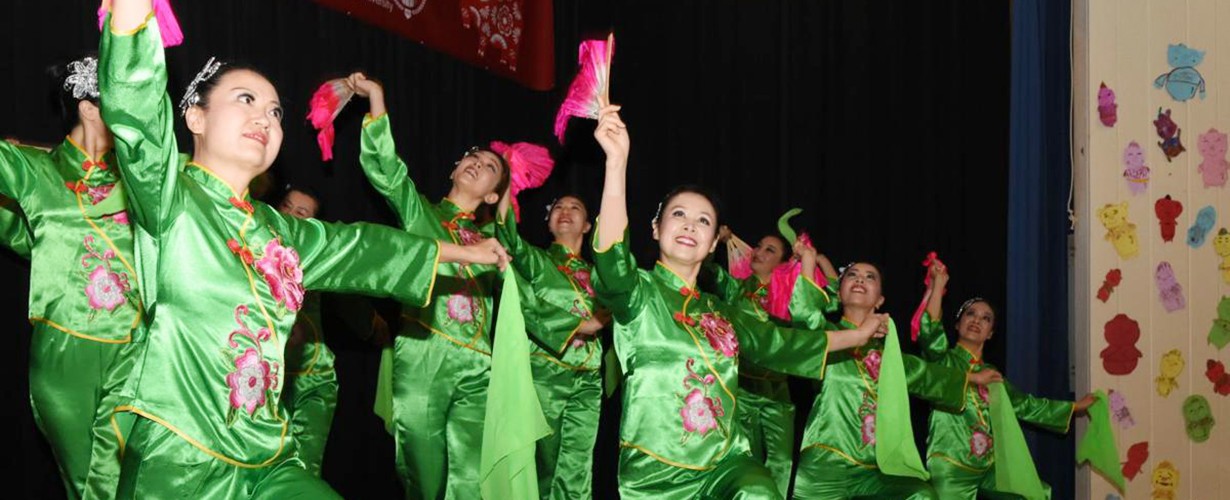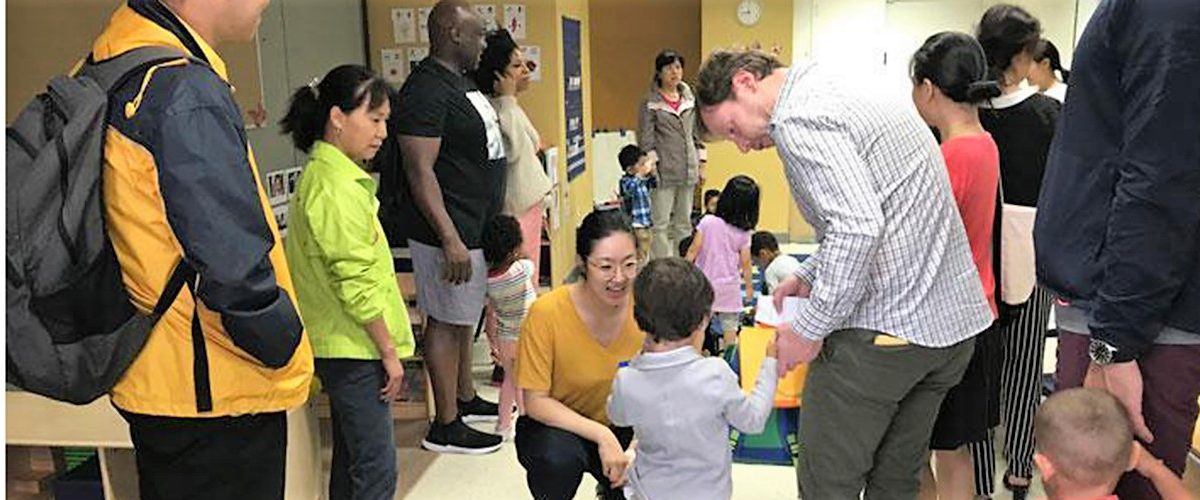
Schools: US immigration policy makes it tougher to hire Chinese teachers
October 17, 2018
Chinese New Year Celebration at HudsonWay Immersion School
February 5, 2019A primary concern of parents dropping off their toddler, as young as age 2, in an immersion environment is that the child has all the normal separation anxiety being placed in the care of someone who is not their relative, in addition to being with someone speaking a language foreign to him/her. So, what can we expect and how we can make this easier for all involved?
We spoke with Patti Summers, a seasoned preschool director with over 40 years of experience and the ECE director at HudsonWay Immersion School’s (HWIS) NY campus. “I was teacher for twenty years: so, not only from an administrator’s but a teacher’s perspective, what really stood out for me was how universally HWIS embodied the idea of acceptance: Who You Are Is What I Love. I first learned about HudsonWay Immersion School in the first year of the existence of the New York campus, but I didn’t actually see the school until I came in to consult, one year ago. When I saw it for the first time, I was thrilled by how happy all the kids seemed. At HWIS it is an unusually quick and easy separation, in part because it is an unusually wonderful staff.
“For many years, parents would say to me, ‘My daughter doesn’t even know you, and she takes your hand!’ I’ve finally figured out what to say to that: it’s that ‘A child can spot a friend.’ It doesn’t matter if children are two years-old or three, or four or five: when they come into school for the first time, and see happy, enthusiastic, emotionally demonstrative teachers who are thrilled to see them, they know they’re spotting a friend.
“We encourage and help parents develop a method for separation. First it is important that even if parents feel bad about leaving, they should not show it to their children. Smile, put on a happy face, give them a hug, and tell them the plan: “I know you’re going to have a great time, and I will see you at [and then fill in the blank with whatever time they’ll be picked up, or whatever time they’ll next see you]. They may not know what the hours mean, but they know that you know, and that makes them feel secure and confident. They know the plan.”
Some children might like to see the schedule of the day because it further reinforces the sense of there being a plan: organization and structure. When it comes to the Separation process, all schools benefit from the fact that children want to like school. They want to go because school is fun! And when parents hear that, they feel better. We must never underestimate the democracy and intelligence of young children, their lack of prejudice, their willingness to adapt and accept if they are accepted and positively encouraged.
There is a little pain in separating from a parent, however, for a child it’s only part of the process of transitioning, and once the process or separation is done, they’re happy to be where they are. For them it is only transitory, and it is often parents and guardians who take the crying and the sadness with them all day: it upsets them, and they think they’re doing the wrong thing. To assuage the anxiety, concerns and possible feelings of guilt of parents, Patti often encourages them to just call five or ten minutes after they leave to check in on their child. Because, nine out of ten times, the process is complete in under five minutes.
At HWIS, the ease of the process is not only a testament to the training and professionalism of the HWIS staff, but the nature of the school environment: ecumenically positive, enthusiastic, approving.
We spoke with Patti Summers, a seasoned preschool director with over 40 years of experience and the ECE director at HudsonWay Immersion School’s (HWIS) NY campus. “I was teacher for twenty years: so, not only from an administrator’s but a teacher’s perspective, what really stood out for me was how universally HWIS embodied the idea of acceptance: Who You Are Is What I Love. I first learned about HudsonWay Immersion School in the first year of the existence of the New York campus, but I didn’t actually see the school until I came in to consult, one year ago. When I saw it for the first time, I was thrilled by how happy all the kids seemed. At HWIS it is an unusually quick and easy separation, in part because it is an unusually wonderful staff.
“For many years, parents would say to me, ‘My daughter doesn’t even know you, and she takes your hand!’ I’ve finally figured out what to say to that: it’s that ‘A child can spot a friend.’ It doesn’t matter if children are two years-old or three, or four or five: when they come into school for the first time, and see happy, enthusiastic, emotionally demonstrative teachers who are thrilled to see them, they know they’re spotting a friend.
“We encourage and help parents develop a method for separation. First it is important that even if parents feel bad about leaving, they should not show it to their children. Smile, put on a happy face, give them a hug, and tell them the plan: “I know you’re going to have a great time, and I will see you at [and then fill in the blank with whatever time they’ll be picked up, or whatever time they’ll next see you]. They may not know what the hours mean, but they know that you know, and that makes them feel secure and confident. They know the plan.”
Some children might like to see the schedule of the day because it further reinforces the sense of there being a plan: organization and structure. When it comes to the Separation process, all schools benefit from the fact that children want to like school. They want to go because school is fun! And when parents hear that, they feel better. We must never underestimate the democracy and intelligence of young children, their lack of prejudice, their willingness to adapt and accept if they are accepted and positively encouraged.
There is a little pain in separating from a parent, however, for a child it’s only part of the process of transitioning, and once the process or separation is done, they’re happy to be where they are. For them it is only transitory, and it is often parents and guardians who take the crying and the sadness with them all day: it upsets them, and they think they’re doing the wrong thing. To assuage the anxiety, concerns and possible feelings of guilt of parents, Patti often encourages them to just call five or ten minutes after they leave to check in on their child. Because, nine out of ten times, the process is complete in under five minutes.
At HWIS, the ease of the process is not only a testament to the training and professionalism of the HWIS staff, but the nature of the school environment: ecumenically positive, enthusiastic, approving.





